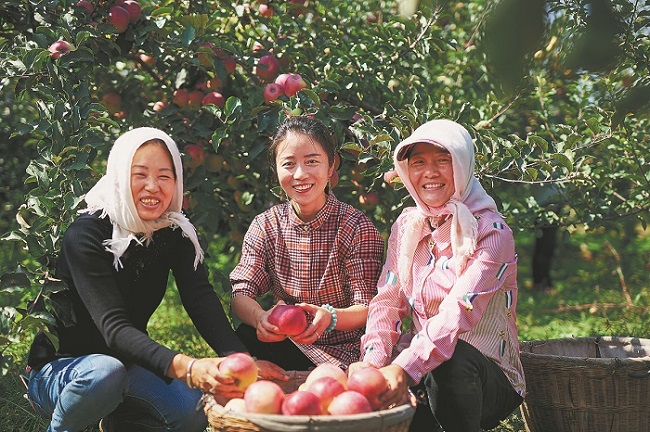
Zhang Cuiyan (center), owner of an agricultural company in Zhongwei, Ningxia Hui autonomous region, harvests apples with local farmers.
After quitting work as an architectural designer, Zhang Cuiyan began selling apples on behalf of farmers in her hometown in the Ningxia Hui autonomous region.
For decades, there were few sales channels for apples grown in Zhongwei city's Shapotou district. That meant it was hard to sell them nationally, so local farmers had to carry their produce to the central market in the city's downtown.
As a child, Zhang often visited the market with her parents. "I remember that one day, after hours of waiting in a long line of farmers in the scorching sun, my parents finally got a chance for middlemen to pick and purchase their fruit. However, the agents had picked enough of other people's fruit and only bought a few of ours," the 39-year-old recalled.
"My parents had to carry the rest of the fruit back home because they could not sell it for a good price at the small market. I felt sad for them, because growing apples was not an easy job."
After graduating from university, Zhang opened an architectural design company with her husband in Ningxia. However, she quit in 2011 to start a new company, Ningxia Shenju Agricultural Science and Technology Development.
That gave her the opportunity to take her parents back home. "I returned to my hometown because my parents could not get used to living in the city," she said.
"They just couldn't forget their apples. I was born and raised in the village, so I decided to help them sell the produce."
The key was finding middlemen to introduce the apples to consumers across the country, because Ningxia's apples were not as well-known as those from the Xinjiang Uygur autonomous region.
"At the beginning, people didn't believe that Shapotou apples were any good. I told the middlemen that they should come to our place and take a look. People tend to stereotype Ningxia as a desert area where the residents ride camels to work, so they should come here and learn about how our economy is developing," she said.
The middlemen quickly began earning a profit from the apples, so Zhang opened her own sales channel. At the same time, she organized about 200 female farmers in a WeChat group and encouraged them to promote their apples on WeChat Moments. For every box they sold, each individual could earn 20 yuan.
"After making some money, the women's confidence grew and they became more dedicated to their careers," Zhang said.
In 2015, she built the first agricultural produce trading market in the village, providing cold-storage rooms and a transportation chain for about 1,200 fruit farmers.
As her company grew, she needed further investment. So in 2017, Zhang obtained an interest-free loan of 500,000 yuan ($73,000) from the China Women's Development Foundation via a program initiated in 1996 to help women build careers.
She received the financial aid after the local federation, which administers the foundation, visited the village and discovered that Zhang's company supported many women.
"The timely aid brought us great benefits, and the farmers were also very happy about it. The following year, my company obtained another loan of 500,000 yuan," she said.
In 2019, she focused on selling apples online, hiring about 50 people for her e-commerce platform. Now, sales generate income of 50 million yuan a year.
She has also cultivated new species of apples at her base and trained farmers in cultivation skills.
"I am quite comfortable and happy to do business in my hometown, especially after discovering that the villagers have such great potential. It's interesting to interact with farmers every day. To share the joy, they tell me how many boxes of apples they have sold and how much money they have made," she said.
She added that the villagers used to earn just 120 yuan a day working odd jobs in cities. Now, though, they can make the same amount simply by selling a few boxes of apples, she said.